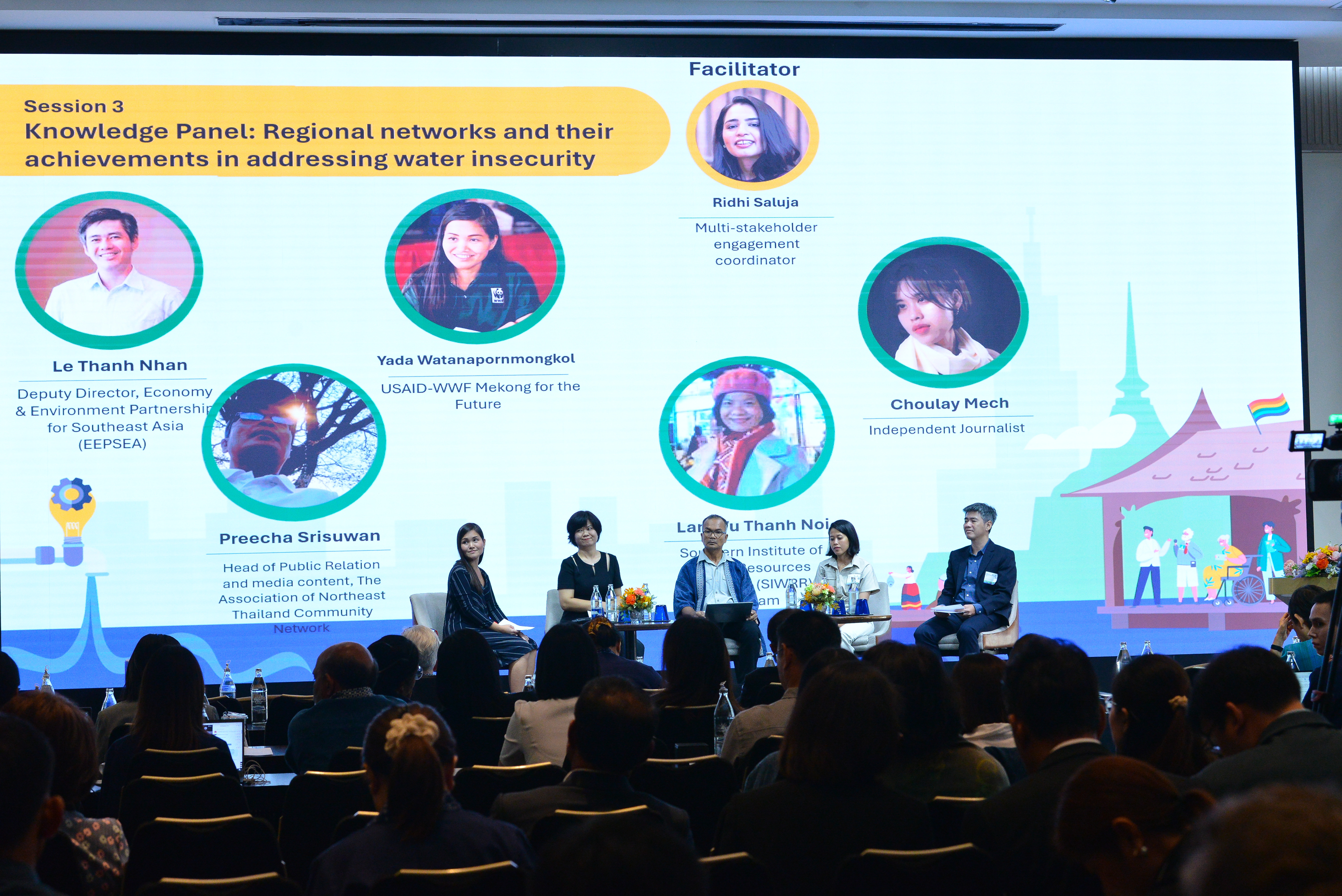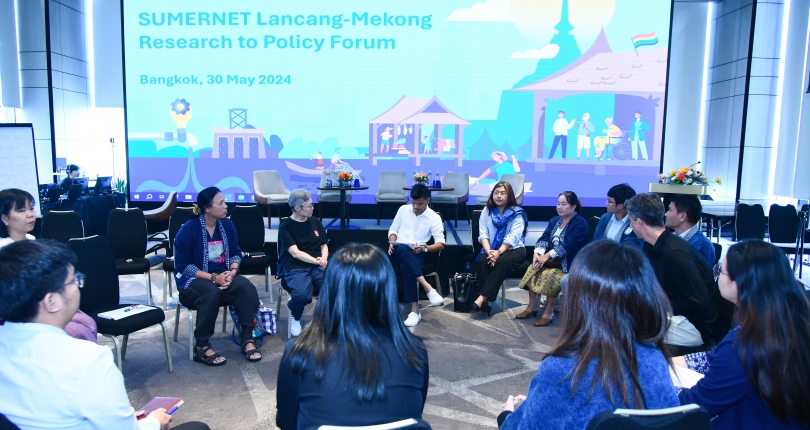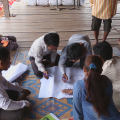Meaningful collaboration is key to addressing “water insecurity” in the Mekong Region
At the SUMERNET Learning Forum held in June, diverse participants shared how to reinforce collaboration and inclusive engagement to address “water insecurity”.
Trust building
“Trust building” between researchers and policymakers or researchers and local communities is critical. Local communities sometimes question what benefit they could get when researchers come to them and ask for a survey or interview. Sometimes, policymakers aren't yet open to researchers’ recommendations because the science is too complex. Researchers are also not trying enough to understand what policymakers or local communities need. At a more significant regional and transboundary level, this is a part of “trust building,” a theme discussed in the SUMERNET Learning Forum held in June.
Reinforce collaboration
It should be acknowledged that cross-cutting transboundary issues require effort from different groups. The Mekong River is a transboundary water resource that requires cooperation among the six Mekong countries (Cambodia, Laos, Myanmar, Thailand, Vietnam, and China) to ensure sustainable development and management of the river's resources. “Reinforcing the relationships and trust” and strengthening regional cooperation can help balance these geopolitical dynamics and promote a more stable and secure environment. While Mekong faces significant environmental challenges, including habitat destruction, pollution, and overfishing, collaboration among countries and international organizations is necessary to address these issues and protect the river's biodiversity and ecosystem services.
Mr. Preecha Srisuwan, Head of Public Relations and Media Content at the Association of Northeast Thailand Community Network, shared that the best way to address the Mekong issue is by “reinforcing cooperation” among all the member states.
However, more than solid collaboration among state actors and regional networks might be needed; collaboration with and among the grassroots actors is required.
As Dr. Surasri Kidtimonton, Secretary-General of the Office of the National Water Resources (ONWR) Thailand and Secretary-General of the Thai National Mekong Committee Secretariat, suggested, “Cooperation should not just be a way to enhance our region’s resilience.”
Inclusive engagement
The voices and stories of the groups most affected by environmental problems often need more space in formal policy-making spaces. Inclusive engagement must become the cornerstone of policymaking. Making space and proactively fostering the inclusion of indigenous peoples and local communities, women, and youth is critical. Multistakeholder engagements such as the ones fostered and facilitated by SUMERNET aim to address this crucial gap and ensure that the voices of the groups most affected by environmental problems find a platform to engage with policymakers.
We should provide space for more regional dialogue that allows people from CSOs, marginalized groups, and local communities to talk and share their experiences and lessons learned on the ground. They can share their concerns from the ground so researchers and policymakers can understand and know what is happening. (Ms. Yada Watanapornmongkol, USAID-WWF Mekong for the Future)
Inclusive engagement is not just a space for policy producers to share problems and solutions; it should allow everyone to share, learn, and engage.
As Dr. Le Thanh Nhan, deputy director of economy and environment partnership for Southeast Asia] shared his experience in his own country, “We should engage more with the government by providing accurate evidence to policymakers so that they can learn from it.”
Another panelist, Mrs. Patcharawee Suwannik, Director of Policy and Master Plan Division, a representative from ONWR, Thailand, stated, “Inclusive cooperation can address water insecurity in the region. By working together and exchanging knowledge, we can improve regional issues and lead to more sustainable development,”

Expanding networks
Numerous regional networks and national institutions, including local NGOs, Think Tanks, and other policy-influencing organizations, have been working to provide solutions towards building a sustainable and resilient Mekong. However, to address transboundary issues, networks must access more information and improve connectivity.
Networking is essential to gather information and solutions from different people. (Dr. Lam Vu Thanh Noi, Senior Institute of Water Resources Research (SIWRR) Vietnam)
Expanding the network is essential to bringing more experts and organizations together to engage in research, policy dialogue, and knowledge sharing on the Mekong's challenges. This collaboration is vital to developing practical solutions in the future. A strengthened network can facilitate dialogue, information sharing, and joint decision-making, ensuring the river's resources are managed sustainably and equitably.
Dwight Jason Ronan, senior program manager, DFAT, Australian Embassy in Thailand, acknowledged the gap between knowledge co-production and policymakers, stating that the Mekong Thought Leadership Think Thanks Program (MTT) and the Sustainable Mekong Research Network (SUMERNET) can be a space to share and provide solutions, and can be used as a boat to bridge scientific knowledge to policymakers in the region by connecting and collaborating.
*Photo 1: Breakout session at SUMERNET Lancang-Mekong Research to Policy Forum. Photo: SEI Asia.
*Photo 2: Knowledge Panel: Regional networks and their achievements in addressing water insecurity. Photo: SEI Asia.
Info
This story is part of the following project
SUMERNET 4 All: Engaging with water insecurity in the Mekong Region
Topic
Country
Related people
You might be interested in
-
SUMERNET Vision Guide introducing the new phase "SUMERNET 4 All"
The new, revised "Vision Guide" for SUMERNET is now available. This vision guide presents an overview of SUMERNET - its origins and governance structure, background to the network, aims, key research areas, engagement with policy, and outreach products
![SUMERNET Vision Guide introducing the new phase "SUMERNET 4 All"]()
-
SUMERNET 4 All Call for Proposals on Joint Action
SUMERNET 4 All (S4A) provides financial support and technical assistance to consortia of researchers and boundary partners from the Mekong Region
![SUMERNET 4 All Call for Proposals on Joint Action]()
-
SUMERNET launches redesigned website to provide a fresh visual look and direction
SUMERNET is proud to announce the launch of our redesigned website to coincide with our new phase of work on addressing water insecurity in the Mekong Region.
![SUMERNET launches redesigned website to provide a fresh visual look and direction]()

 By
By




 Read more about SUMERNET
Read more about SUMERNET
